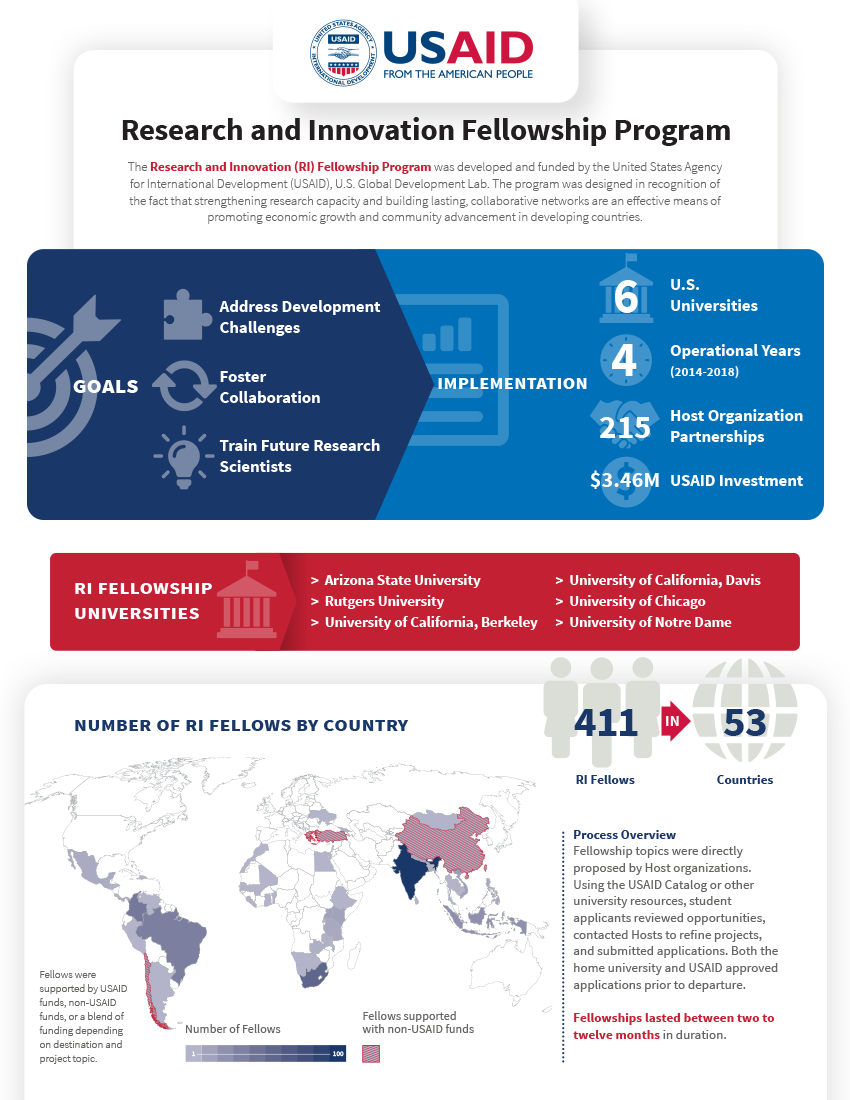- What We Do
- Agriculture and Food Security
- Democracy, Human Rights and Governance
- Economic Growth and Trade
- Education
- Environment and Global Climate Change
- Gender Equality and Women's Empowerment
- Global Health
- Humanitarian Assistance
- Transformation at USAID
- Water and Sanitation
- Working in Crises and Conflict
- U.S. Global Development Lab
Speeches Shim
The Research and Innovation (RI) Fellowship Program was developed and funded by the United States Agency for International Development (USAID), U.S. Global Development Lab. The program was designed in recognition of the fact that strengthening research capacity and building lasting, collaborative networks are an effective means of promoting economic growth and community advancement in developing countries.
Goals
Address Development Challenges
Foster Collaboration
Train Future Research Scientists
Implementation
6 U.S. Universities
4 Operational Years (2014-2018)
215 Host Organization Partnerships
$3.46M USAID Investment
RI Fellowship Universities
- Arizona State University
- Rutgers University
- University of California, Berkeley
- University of California, Davis
- University of Chicago
- University of Notre Dame
Number of RI Fellows by Country
411 RI Fellows in 53 Countries
Number of Fellows by Country
Fellows were supported by USAID funds, non-USAID funds, or a blend of funding depending on destination and project topic.
* Fellows supported with non-USAID funds
- Argentina* (1)
- Dominican Republic (1)
- Honduras (3)
- Burma (1)
- South Africa (62)
- Bangladesh (3)
- Ecuador (1)
- India (102)
- Namibia (1)
- Sri Lanka (1)
- Benin (2)
- Egypt (1)
- Indonesia (6)
- Nepal (8)
- Taiwan* (1)
- Brazil (42)
- El Salvador (2)
- Lebanon (1)
- Panama (8)
- Tanzania (3)
- Bahamas (1)
- Ethiopia (2)
- Liberia (2)
- Peru (1)
- Thailand (7)
- Botswana (1)
- Gambia (1)
- Kenya (12)
- Philippines (8)
- Turkey* (2)
- Cambodia (3)
- Georgia (1)
- Malawi (2)
- Rwanda (1)
- Uganda (9)
- Chile (8)
- Ghana (2)
- Mali (1)
- Senegal (2)
- Ukraine (1)
- China* (2)
- Greece* (2)
- Mexico (5)
- Sierra Leone (1)
- Venezuela (1)
- Colombia (45)
- Guatemala (5)
- Mongolia (1)
- Singapore* (1)
- Vietnam (16)
- Costa Rica (1)
- Haiti (2)
- Morocco (1)
- Zambia (4)
Process Overview
Fellowship topics were directly proposed by Host organizations. Using the USAID Catalog or other university resources, student applicants reviewed opportunities, contacted Hosts to refine projects, and submitted applications. Both the home university and USAID approved applications prior to departure.
Fellowships lasted between two to twelve months in duration.
Fellows were supported by USAID funds, non-USAID funds, or a blend of funding depending on destination and project topic.
The RI Fellows worked with Host organizations where they were able to conduct a wide range of activities including applied research, establishing relationships with international researchers, participating in community meetings, presenting project findings, and preparing publications. The fellows engaged their own research interests and were able to work in a wide range of disciplines that included: agriculture, public health, data management, mapping, ecosystems, finance, public policy, education, food security, energy, water and sanitation, and sustainability.
The RI Fellowship successfully achieved a notable participation of female fellows. Through their work, these female scientists were given the opportunity to promote women’s role in science related fields and helped strengthen the pathways of women in the field of international scientific collaboration.
Outputs and Outcomes
Over the course of four years, the work undertaken by the Fellows generated 314 separate project reports detailing the research that was completed, and in most cases, the practical applications for furthering development.
This work allowed RI Fellows to exchange knowledge and research techniques with their Host counterparts, thereby building their research capacities. The program created partnerships with 215 Host organizations.
RI Fellows built capacity by enhancing development by creating in-country knowledge and expertise, which prepares local scientists and institutions to address development problems on their own. Pairing researchers from different countries and cultures amplifies this aspect of collaboration and can result in the creation of innovative approaches for solving many complex development problems.
The Research Technical Assistance Center (RTAC) is made possible by the generous support of the American people through the United States Agency for International Development (USAID) under the terms of contract no. 7200AA18C00057. This two page report was produced by NORC at the University of Chicago and John Duffy (University of Alaska, Anchorage) and is the sole responsibility of RTAC and NORC at the University of Chicago, and do not necessarily reflect the views of USAID or the United States Government.


Comment
Make a general inquiry or suggest an improvement.